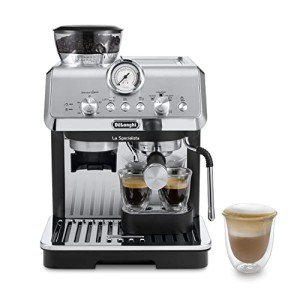The Next Big Thing In Home Use Espresso Machines

Home Use Espresso Machines: A Comprehensive Guide
Espresso machines have actually become a staple in many families as coffee enthusiasts seek to reproduce café-quality brews in the convenience of their cooking areas. The rise in popularity has led to a diverse market filled with different models, functions, and costs. This post intends to supply a helpful overview of home use espresso machines, helping readers navigate their options efficiently.
Comprehending Espresso Machines
Espresso machines work by forcing hot water through finely-ground coffee under high pressure, leading to a focused coffee beverage understood as espresso. There are several types of espresso machines categorized based on their brewing approaches and level of automation. The most typical types consist of:
- Manual Espresso Machines: These require the user to manage the pressure and water flow, permitting for a more hands-on coffee-making experience.
- Semi-Automatic Espresso Machines: These offer automatic control over water pressure, while the user by hand grinds and tamps the coffee.
- Automatic Espresso Machines: With the push of a button, these machines automatically control the circulation of water, making it much easier to brew espresso with consistent outcomes.
- Super-Automatic Espresso Machines: These all-in-one machines manage grinding, tampering, developing, and even milk frothing, making them ideal for users searching for convenience.
- Pill or Pod Machines: These use pre-packaged coffee pods to create espresso with minimal effort, but they restrict option in brewing strategies and flavors.
Table: Comparison of Espresso Machine Types
| Type | Control Level | Ease of Use | Cleaning up Level | Ideal For |
|---|---|---|---|---|
| Manual | User-controlled | Moderate | High | Coffee perfectionists |
| Semi-Automatic | Partial automation | Moderate | Moderate | Home baristas |
| Automatic | Fully automated | Easy | Low | Busy people |
| Super-Automatic | Fully automated | Very simple | Really low | Convenience hunters |
| Capsule/Pod | Totally automated | Really easy | Really low | Casual drinkers |
Key Features to Consider
When picking a home use espresso machine, it's necessary to think about numerous features that can considerably impact the quality of espresso and user experience.
- Pressure: Look for machines that provide at least 9 bars of pressure, as this is thought about optimal for brewing espresso.
- Boiler Systems: Single vs. dual boiler systems figure out temperature stability and the ability to brew espresso and steam milk simultaneously.
- Grinder: Integrated mills permit for freshly ground coffee, which boosts taste. Consider machines with adjustable grind settings.
- Milk Frother: For those who delight in coffees and lattes, an integrated steam wand or automatic frother is important.
- Size and Design: Consider your kitchen area area and visual preferences. Machines come in different sizes, from compact to large setups.
- Price: Home espresso machines can range from a few hundred to a number of thousand dollars, so it's essential to develop a budget before exploring options.
Pros and Cons of Home Use Espresso Machines
| Pros | Cons |
|---|---|
| Convenience of brewing coffee in your home | Preliminary financial investment can be high |
| Quality of espresso is frequently superior | Needs some skill, especially with manual machines |
| Capability to explore flavors | Upkeep and cleansing can be labor-intensive |
| Can save cash in the long run | Not all machines will match every coffee choice |
Upkeep and Cleaning Tips
Keeping an espresso machine is important for extending its life and guaranteeing consistent brew quality. Here are some beneficial suggestions:
- Regular Descaling: Minerals from water can build up in the machine. Descale every 1-3 months, depending on water hardness.
- Daily Cleaning: Rinse portafilters, baskets, and steam wands after each use to avoid coffee oils from developing residue.
- Use Filtered Water: This can help in reducing mineral buildup and improve the taste of coffee.
- Replace Gaskets and Seals: These components might wear out in time and should be replaced to maintain pressure and efficiency.
- Read the Manual: Each machine has particular care directions; following these will make sure longevity.
FAQs About Home Use Espresso Machines
Q1: What is the best budget espresso machine?The best budget espresso machine typically depends upon private needs, but models like the DeLonghi EC155 or the Breville Bambino are popular amongst users for providing fantastic worth. Q2: How long do home espresso machines typically last?With proper upkeep, home espresso machines can last anywhere from 5 to 15 years, depending upon the quality of the machine and frequency of use. Q3: Can I make cappuccinos and lattes with any espresso machine?While most espresso machines can make coffees and lattes, having a reliable
steam wand or frother is necessary for attaining the right milk texture.
Q4: Are super-automatic machines worth the investment?For those who prioritize convenience and fast developing, super-automatic machines can be worth the investment, though they may lack some customizability in brew strength and taste. Q5: What types of coffee beans are best for espresso?While personal choice contributes, beans labeled as" espresso "blends are normally roasted darker, producing rich flavors and a velvety texture when brewed.
Investing in a home espresso machine can change the everyday coffee routine into something unique, raising home brews to café quality. By understanding the different types of machines, essential features to consider, maintenance needs, and weighing the
benefits and drawbacks, customers can make educated decisions that suit their individual preferences. As Energy-Efficient Espresso Machines continues to grow, no matter the option, every brew can be a tasty experience waiting to be savored.

